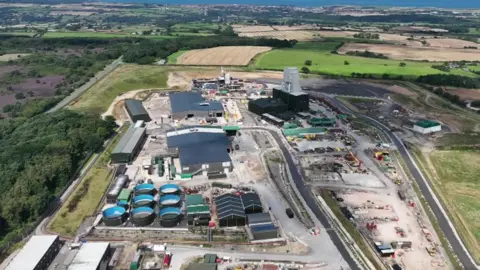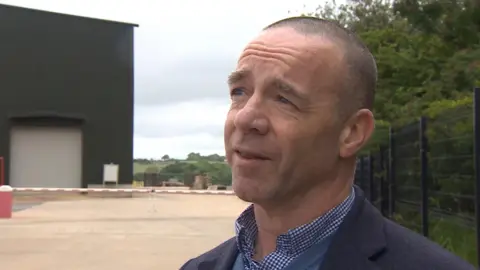Mine job losses expected as work slows
 BBC
BBCJob losses are expected at one of the largest mining projects undertaken in decades after its owner announced spending cutbacks.
Woodsmith Mine near Whitby extracts polyhalite for the production of fertiliser, but owner Anglo American said it was under pressure to reduce costs at the mine which costs £2m a day to run.
Work on a 23-mile tunnel linking the mine to its processing and export plant on the River Tees will now slow down before the final six miles are completed.
Anglo, which took over the site from Sirius Minerals in 2020, has not indicated how many of the 2,000 people involved at the site could be affected.

The sinking of the production shaft will also be paused, but work on a service shaft that has reached the halfway point will continue.
The majority of staff are contractors, with only 375 employed directly by Anglo American.
The company's head of social performance, Matt Parsons, said: “It will have an impact on the workforce and there will be job losses.
“So we’re working through those numbers at the moment, as our contractors will be."
Mr Parsons said the company expected to be in a position to understand more about the number of jobs at risk in the next 10 days.
Most workers are employed by three major contractors.
Teesside-based Woodsmith Construction Group has contracted for Anglo American for the last three years.

Managing director Gary Wood said: “We’ve carried out numerous activities (for them), including civil engineering and architectural packages.
"We continue to support Anglo as it stands today.”
The mine has generated around £1.8bn for the economy in Yorkshire and the North East of England since 2017.
Anglo has recently turned down three takeover proposals from a larger Australian rival, but will divest itself of business interests in South Africa to build cash reserves and appease shareholders.
It will also look for partners to join the Woodsmith scheme.
The deposits of polyhalite, a naturally occurring mineral, beneath the North York Moors National Park, are believed to be the largest in the world.
The mine, which has a lifespan of 100 years, is planned to have the deepest commercial shafts in the country and, once operational, will be Europe's deepest mine, according to Anglo.
The minerals will be transported on an underground "conveyor belt" to minimise the impact on the National Park's environment.
Follow BBC Yorkshire on Facebook, X (formerly Twitter), and Instagram. Send your story ideas to [email protected]
